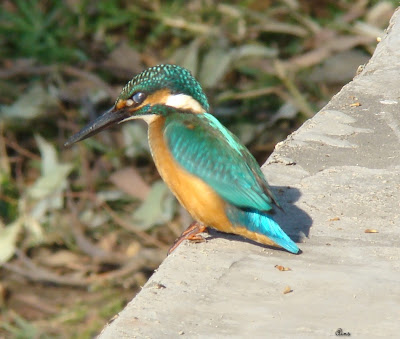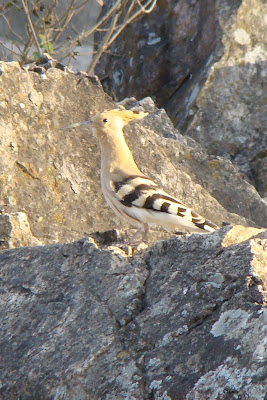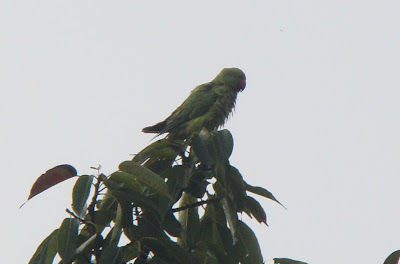Mount Abu Birds - Mid-November 2009: A Haven Despite Challenges.
Mount Abu, with its unique geography and ecology, stands as a notable hill station in Rajasthan, India. While it harbours a rich avian diversity, the sanctuary faces many environmental challenges that affect the region’s bird life. Among these, water scarcity remains one of the most pressing issues. The limited number of water bodies in the area can only support a select few species of aquatic birds, adding complexity to the overall birdwatching experience.
Challenges to Bird Diversity
Despite its beauty, Mount Abu's limited size hampers its bird diversity. Several factors contribute to this.
Small Geographic Area
Unlike vast ecosystems that can support a large diversity of species, Mount Abu’s smaller size restricts obtaining resources and living space, leading to a more modest bird population. Smaller habitats often support fewer species, a trait that Mount Abu also shows.
Habitat Types
The primary habitats in Mount Abu include tropical dry deciduous forests, scrublands, and a few grasslands. While these ecosystems provide a home for specific bird communities, they do not cater to species that require wetlands or dense, tropical forests. The region’s habitat types limit the diversity of bird species, as many specialised birds thrive only in specific conditions.
Seasonal Variations
Mount Abu witnesses fluctuating climatic conditions, which affect its resident bird population. While the hill station attracts a variety of migratory species during certain seasons, the number of year-round residents is low. Dry periods and fluctuating food availability during the off-season make survival difficult for many species.
Human Encroachment
Mount Abu faces the dual challenges of urbanisation and increasing tourism, both of which contribute to habitat fragmentation. As the human population grows and infrastructure expands, it displaces sensitive bird species and disrupts their habitats. Noise, pollution, and traffic can further disturb the delicate balance of Mount Abu’s natural environment.
Water Scarcity
Water scarcity remains a critical concern during years of poor monsoon seasons. This affects water-dependent bird species, making it difficult for them to survive, especially in areas where water resources are already scarce.
Altitude and Isolation
Because Mount Abu is an isolated hill station, its disconnection from other major bird habitats prevents species from moving across a broader landscape. Its altitude further restricts birds adapted to either lower or higher altitudes, narrowing the range of species that can colonise the region.
Despite the Challenges, Mount Abu Remains a Birdwatcher’s Paradise.
Although these challenges pose a threat to Mount Abu’s avian biodiversity, the hill station still supports several fascinating species. Among them are the Green Munia, Indian Paradise Flycatcher, Tickell’s Blue Flycatcher, Indian Scimitar-Babbler, Red Spurfowl, and Gray Junglefowl—each a remarkable sight for birdwatchers.
The key to preserving and enhancing the bird life of Mount Abu lies in conservation efforts, which must prioritise habitat restoration, responsible tourism, and protecting sensitive species.
+005.jpg) |
| Black Redstart - Phoenicurus ochruros |
 |
| Black-rumped Flameback Taken on my morning walk in a field near the Air Force cantonment area |
 |
Black-winged Kite Taken in Dhundai Old Pilgrim Road |
 |
Black-winged Kite Taken in Dhundai Old Pilgrim Road |
 |
Common Kingfisher Taken on the way to Honeymoon Point |
 |
| Common Kingfisher - Alcedo atthis |
 |
| Common Kingfisher - Alcedo atthis |
 |
Common Sandpiper - Actitis hypoleucosThe stream that flows in Dhundai |
 |
| Graceful Prinia Prinia gracilis |
 |
| Eurasian Hobby - Falco subbuteo On my walk to Gyan Saravor |
 |
| Eurasian Hobby - Falco subbuteo |
 |
| Eurasian Hobby - Falco subbuteo On my walk to Gyan Saravor |
 |
| Eurasian Hobby - Falco subbuteo On my walk to Gyan Saravor |
Indian Cormorant - Phalacrocorax fuscicollist The stream in Dhundai
 |
Indian Cormorant - Phalacrocorax fuscicollist The stream in Dhundai |
 |
Indian Cormorant - Phalacrocorax fuscicollist The stream in Dhundai |
 |
Indian Cormorant - Phalacrocorax fuscicollist The stream in Dhundai |

Shikra - Accipiter badius
The Old Pilgrim Road Nr. Neelkant Temple
 |
| Crested Serpent-Eagle - Spilornis cheela |
Honeymoon Point
 |
| Crested Serpent-Eagle - Spilornis cheela |
 |
| Crested Serpent-Eagle - Spilornis cheela |
 |
| Crested Serpent-Eagle - Spilornis cheela |
 |
| Long-tailed Shrike - Lanius schach |
Nr My Dhundai house close to Neel Kant Temple
 |
| Long-tailed Shrike - Lanius schach |
Mini Nakki Lake on the way to Oria
 |
| Long-tailed Shrike - Lanius schach |
l
 |
Rose-ringed Parakeet - Psittacula krameri
 |
| Oriental Turtle-Dove - Streptopelia orientalis |
 |
| Indian Peafowl - Pavo cristatus Behind the Dilwara Temple |
 |
| Pied Kingfisher - Ceryle rudis |
The steam in front of Neel Kant Temple
 |
| Pied Kingfisher - Ceryle rudis |
 |
| White-browed Wagtail - Motacilla maderaspatensis |
On my Nakki Lake round
 |
| Indian Pond-Heron - Ardeola grayii |
 |
| Large-billed Crow - Corvus macrorhyncho |
 |
| Scaly-breasted Munia - Lonchura punctulata |
Opp my house Neel Kant

Eurasian Hobby - Falco subbuteo
Threesome
White-browed Wagtail
White-browed Wagtail
Spot-breasted Fantail - Rhipidura albogularis
Woolly-necked Stork - Ciconia episcopus
Opposite the Air Force base
MOUNT ABU BIRDS MY PERSONAL COLLECTION
CLICK





Lovely. Thanks for the update.
ReplyDeleteIt is such a coincidence that I had visited the blog early yesterday morning wondering why there were no updates for such a long time. :)
Thanks for sharing these wonderful pics.
wish I were there to be in the company of the birds that you captured. As children we always thought of those beauties being stuffed and hung around in our rooms. however, the notion has undergone metamorphosis. thanks much for those pictures. may the good lord keep you forever in their jocund company. Much love, Noel.
ReplyDeleteDear
ReplyDeleteSir
How r u? I found your blog full of information and very interesting photographs perhaps in future I will make same as you I really like all your collection!!!
Take care
Guide Charles
Dear
ReplyDeleteSir
How r u? I found your blog full of information and very interesting photographs perhaps in future I will make same as you I really like all your collection!!!
Take care
Guide Charles